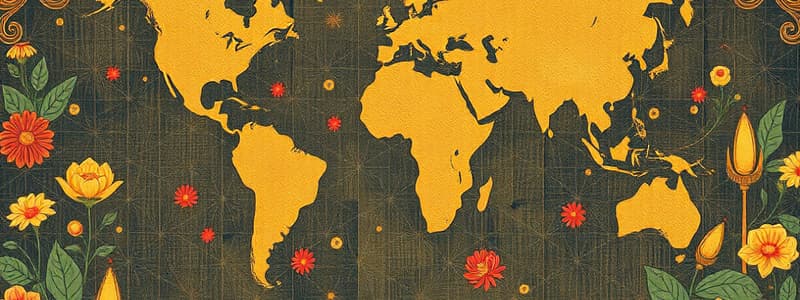Podcast
Questions and Answers
What does 'liberalization' in the context of globalization refer to?
What does 'liberalization' in the context of globalization refer to?
- Establishing trade agreements
- Increasing interdependence between countries
- The spread of Western culture worldwide
- Removing restrictions on resource movement between countries (correct)
Universalization describes the growth of transactions and interdependence between countries.
Universalization describes the growth of transactions and interdependence between countries.
False (B)
The perspective of the individual defining globalization influences its ______.
The perspective of the individual defining globalization influences its ______.
definition
Who defined globalization as the 'onset of a borderless world'?
Who defined globalization as the 'onset of a borderless world'?
Which perspective emphasizes the 'end of geography' in globalization?
Which perspective emphasizes the 'end of geography' in globalization?
Match the scholars with their definitions of globalization:
Match the scholars with their definitions of globalization:
Globality refers to a social condition characterized by interconnected relationships.
Globality refers to a social condition characterized by interconnected relationships.
According to Manfred Steger, globalization is the expansion and intensification of social relations and consciousness across ______.
According to Manfred Steger, globalization is the expansion and intensification of social relations and consciousness across ______.
Flashcards are hidden until you start studying
Study Notes
Main Definitions of Globalization
- Internationalization: Growth of transactions and interdependence between nations.
- Liberalization: Removal of restrictions on resource movement, promoting a borderless global economy.
- Universalization: Spreading of objects and experiences universally.
- Westernization: Global spread of Western social structures and norms.
Definitions by Scholars
- Kenichi Ohmae (1992): Envisioned globalization as the emergence of a borderless world.
- George Ritzer (2015): Described globalization as increasing liquidity and multidirectional flows of people, objects, places, and information.
- John Tomlinson (1999): Identified globalization as central to modern cultural dynamics.
- David Gray (1998): Defined globalization as a long-term process driven by technological advancements.
Key Themes and Characteristics (Manfred Steger, 2014)
- Globality: A social condition marked by interconnected economic, political, cultural, and environmental relationships.
- Globalization: Processes that transform a weakening national identity into a state of globality.
- Global Imaginary: Growing awareness among individuals of their belonging to a global community.
Contending Perspectives on Globalization
- Liberal (Hyperglobal): Emphasizes the elimination of geography and nation-states, advocating for a borderless world.
- Conservative (Skeptical): Minimizes globalization, viewing it more as internationalization or regionalization, maintaining a state-centric viewpoint.
- Critical (Transformational): Recognizes the state as a conduit for flows of power and political influence across boundaries.
Underlying Reasons for Different Definitions of Globalization
- Perspective: Individual viewpoints shape the definition of globalization, influencing subjective interpretations as positive or negative.
- Debate: Cesare Poppi highlighted the notion that "Globalization is the debate and the debate is globalization."
- Shifting Nature: Globalization is a dynamic and evolving phenomenon reflecting human societal development.
Globalization and Globalism
- Globalization: Described by Manfred Steger as the expansion and intensification of social relations and consciousness across time and space.
- Globalism: Represents the belief held by influential individuals that global economic integration enhances freedom and democracy for all.
Studying That Suits You
Use AI to generate personalized quizzes and flashcards to suit your learning preferences.




